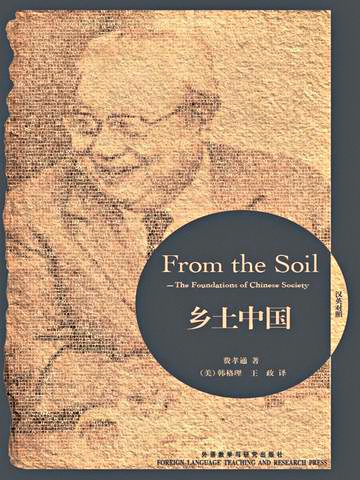Chinese Society Nurtured from the Soil
China Today,January 03, 2018 Adjust font size:

From the Soil – The Foundations of Chinese Society
Author: Fei Xiaotong Price: RMB 22.50 Paperback, 176 pages
Published by Foreign Language Teaching and Research Press
From the Soil – The Foundations of Chinese Society, the representative work of sociologist and anthropologist Fei Xiaotong, (or Fei Hsiao-Tung), is a compilation of his lecture notes from the late 1940s, when he taught rural sociology at the National Southwest Associated University and Yunnan University. Fei likens the Chinese rural society to a human body. His examinations and observations of it are hence an analysis of its vital organs. The author’s studies are rooted in the ways of life and customs of China’s rural communities. Although decades have since passed, Fei’s theoretical statements about the nature of Chinese society remain valid, and make it a compelling reading.
Fei’s approach to teaching at universities was to focus on meaningful sociological issues through discussions with his students, rather than getting them to memorize textbooks. As the Chinese saying goes, “newborn calves do not fear tigers,” Fei was happy to lead the youth in his classes to explore untrodden areas of knowledge. As a teacher of rural sociology, Fei did research specifically on the distinct characteristics of Chinese rural society. In his classes, he would raise bold, raw ideas, in the belief that taking his students by surprise with such unrefined notions would jolt them out of their accustomed passivity into independent thinking and reasoning. Fei Xiaotong was convinced that teachers should not rely on textbooks to impart knowledge, but rather guide the youth through uncharted territories where they may seek it out of their own volition.
Fei Xiaotong (1910-2005) was born in Wujiang County of Jiangsu Province. A pioneering Chinese researcher and professor of sociology and anthropology, he was noted for his studies of China’s ethnic minorities. He was also a social activist. From 1936 to 1938, Fei studied at the London School of Economics under the pioneer anthropologist Bronisław Malinowski. Fei wrote his PhD thesis based on his earlier fieldwork in Kaixiangong Village, where his hometown was located, and published it under the title “Peasant Life in China” (1939). It is regarded as a milestone in Chinese sociological and anthropological field investigations. In March 1980, he was awarded the Bronislaw Malinowski Award of the Society for Applied Anthropology; in November 1981, the Huxley Memorial Medal of the Royal Anthropological Institute of Great Britain and Ireland; and in 1988 the Encyclopaedia Britannica Prize in New York.
In his works, Fei summarized various models of rural economic development in China based on his fieldworks, and wrote an impressive body of highly influential works. From the Soil is internationally acknowledged as a seminal work on the traditional culture of China’s rural society and it describes the contrasting organizational principles of Chinese and Western societies.
In contrast to Peasant Life in China, which gives a sketch of a specific rural community, From the Soil expands on concepts derived from Fei’s observations of Chinese society. Its focus is on China’s grassroots social system which, coexistent with others, influences all aspects of social life. An understanding of the workings of this core social order gives insight into Chinese society as a whole. Fei borrowed the term “ideal type” in English to refer to people’s cognition of concepts formed from characteristics and elements of the given phenomena.
The primary aim of From the Soil, therefore, is not to depict an image of Chinese rural life, but to analyze the structure of Chinese society and the Chinese national character, and how such structure and national character is formed. This is not an encyclopedia-style analysis, but one based on certain features of the Chinese social order, such as the differential mode of association, differences in how men and women are perceived, clan, blood ties, and geographical relationship, from which the reader gains the “skeleton key” to Chinese society.
In this way, Fei Xiaotong provides young students inexperienced in the research environment a viable approach to conduct research. In presenting a panoramic view of Chinese society which maps out all its facets, the book enables the student to home in on each according to his or her preferred sequence.
Moreover, although the Chinese society that was nurtured from the soil is gradually evolving from a traditional rural society to a modern one, the soul of the Chinese soil nonetheless endures in every aspect of modern China.
The Chinese nation has maintained close ties with its soil for over 5,000 years of vicissitudes. To a nation with a rich farming culture the soil is the lifeblood of its folk, and has nurtured in the Chinese their distinct and admirable traits. As China’s economy rapidly develops, the countryside has gradually become besieged with steel fences embedded in reinforced concrete. The innate value of From the Soil may be the chance it offers to rediscover the warmth and innate sense of justice that modern society obscures.
Fei’s observations and analysis of traditional Chinese society in From the Soil are the key to understanding and grasping the development of Chinese rural social history. As one of China’s foremost social anthropologists Fei maintained the cultural self-consciousness necessary to understand and expound on China’s culture. By focusing on problems fundamental to Chinese society, and combining sociological theories with China’s reality, Fei Xiaotong manifested his deeply humane solicitude for Chinese society.